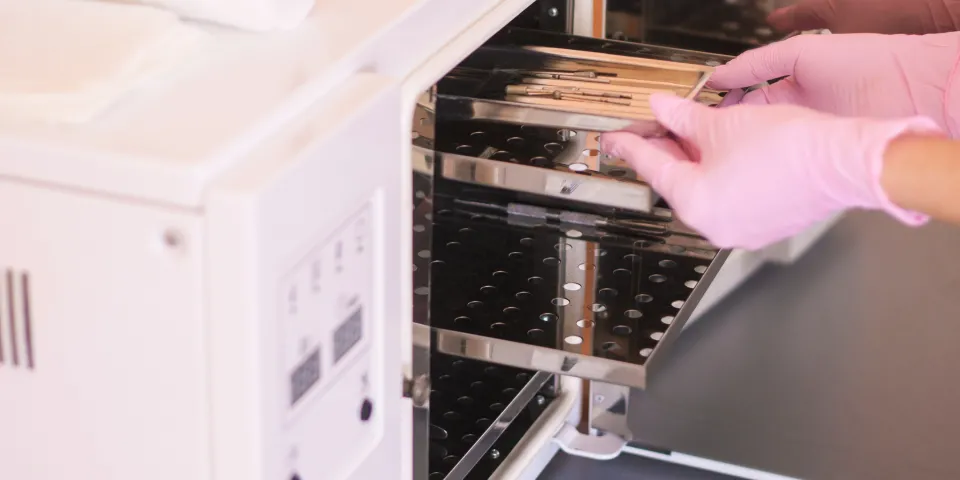Latest
Sterile Processing: A Career Path at the Heart of the Hospital
Jan 11, 2022

Most people understand the work done by doctors, nurses and EMTs to help save lives, but there are plenty of jobs being done in hospitals and surgical facilities around the world that don’t get the recognition they deserve. These are vital for patient well-being and to the healthcare profession.
Some of the most notable advances in healthcare in the past 100 years or even the last several decades are due to a greater focus on equipment sterilization, effectiveness, and availability. A Sterile Processing degree puts you on the front lines to save lives. It’s a job that’s in-demand and can offer you a great start toward a lifelong healthcare career.
Here are a few things you may not know about sterile processing:
What is “Sterile Processing?”
Sterile Processing is the cleaning and decontamination of instruments and devices used by medical professionals. The goal is to make sure these tools that help sustain and save lives provide as little risk to a patient’s health and wellness as possible. That’s why sterile processing is sometimes called the “most crucial link in the chain of care.”
What are some benefits to a career in sterile processing?
The work you will do as a sterile processing professional directly affects the life-saving care of surgeons, physicians, nurses and anesthesiologists. In the medical field, the difference between success and failure, life and death, can be how clean an instrument is or how precise a piece of equipment functions. That’s in your hands.
What does a career path look like for someone who starts in sterile processing?
You’ll likely begin as a Sterile Processing Technician, but dedicated professionals can move in a variety of directions. You can enter a management role within the department or move into specialized facilities that use different types of instrumentation or medical equipment. Moving forward, with extra education and training, you can pursue career paths into surgical technology and/or nursing.
What are some key hard and soft skills required for someone in this field?
A few hard skills to have include an understanding of:
- Basic life support
- Decontamination processes
- Infection control
- Sterility
Some soft skills that would be useful for sterile processing careers are:
- Adaptability
- Being detail-oriented
- Communication
- Teamwork
- Organization
- Vigilance
What is a “day in the life” for sterile processing professionals?
As a sterile processing professional, you would lead the process of cleaning reusable surgical instrumentation and devices, from washing, sterilizing, and cooling to assembling, packaging, and storing. Decontamination — where instruments are cleaned of all bioburden — and sterilization would be an essential part of your typical day. You would also prepare the next day’s case carts with all trays and supplies based on a surgeon’s preference card.
Why should I apply to Herzing’s Sterile Processing program?
Herzing University courses are designed to prepare students to take the Certified Registered Central Service Technician (CRCST) certification examination. To qualify for the CRCST exam, you’ll need to first complete 400 hours of professional experience. At Herzing, courses could include Anatomy and Physiology, Microbiology, Medical Terminology, and more. Toward the end of the Diploma program, you will also take three to four surgical technology (ST) classes that focus on surgical services and sterile processing. This program is also an ideal pathway into Surgical Technology and related careers.
If you want to make a difference in the health care field but are not looking to work with patients directly, a career in sterile processing might be the path for you. For more information about Herzing’s Sterile Processing program, visit the program page online.
Learn More About Our Sterile Processing Program
BLS pay estimates calculate the median annual wage for various occupations. Per the BLS the median wage for an occupation is: "The wage at which half of the workers in the occupation earned more than that amount, and half earned less. Median wage data are from the BLS Occupational Employment and Wage Statistics survey." Bureau of Labor Statistics (BLS), U.S. Department of Labor, Occupational Outlook Handbook 2024. BLS median wage estimates do not represent entry-level wages and/or salaries. Multiple factors, including prior experience, age, geographic market in which you want to work, and degree level and field, will affect career outcomes, including starting salary and earnings as an experienced employee. Herzing neither represents that its graduates will earn the median salaries calculated by BLS for a particular job nor guarantees that graduation from its program will result in a job, promotion, particular wage or salary, or other career growth.
Latest
Recent Blog Posts
Subscribe to our Newsletter
Get the latest news you need to know, from study hacks to interview tips to career advancement. Have it delivered right to your inbox biweekly.








